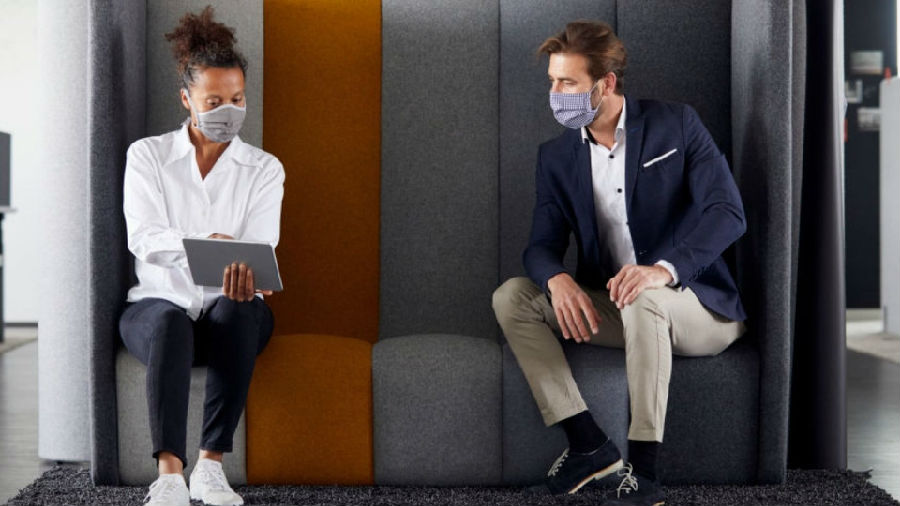Facial expressions are the primary way people exhibit emotion and decipher the feelings of others. Happiness, sadness, disgust, fear and surprise can be communicated through facial expressions alone. But when part of the face is masked, it becomes more difficult to recognize these cues.
面部表情是人们表露感情和解读他人感情的主要方式。快乐、悲伤、厌恶、恐惧和惊讶之情都可以单单通过面部表情来传达。但是如果一部分脸被口罩遮盖,辨识这些线索就更为困难。
If you cannot read someone else's emotional state, your ability to empathize with them may be compromised. Likewise, if your own mask is hiding your emotional state, others may not be able to empathize with you. Wearing a mask can also make you feel more distracted and self-conscious, further weakening your connection to others.
如果你无法解读他人的情绪状态,你体恤别人的能力也许会大打折扣。同样,如果你的口罩遮盖住了你的情绪状态,他人也许无法同情你。佩戴口罩还会让你感觉更心烦意乱、更不自在,进一步弱化你和他人的纽带。
Fortunately, you can regain some control over communication by working with what you have left -- the eyes. If you want to increase understanding with a masked individual, you should look them in the eyes, which may be easier said than done. Eye contact triggers self-consciousness, consumes extra brain power and becomes uncomfortable after only three seconds. But bear in mind, eye contact can also make you appear more intelligent and trustworthy.
幸运的是,你可以通过利用没被口罩遮盖的双眼来重获对交流的控制。如果你想增进对戴口罩者的理解,你应该凝视他们的眼睛,不过这可能说起来容易做起来难。眼神接触会让人不自在,额外消耗脑力,而且短短三秒就会让人不舒服。但是要记住,眼神接触还会让你看起来更聪慧更可靠。
You might be surprised how much information is conveyed by the body itself.
你也许会对身体传达的信息量如此庞大而感到吃惊。
For instance, when someone is happy, they stand up straighter and lift their head; when they are sad, they slouch and drop their head; and when they are angry, their whole body tenses up. Learning how people use their bodies to convey emotion may help reduce the uncertainty you feel when communicating with someone in a mask.
举例来说,当某人快乐时,会挺胸抬头;当某人悲伤时,会垂头丧气;当某人愤怒时,就会全身绷紧。了解人们如何运用身体来传达感情也许有助于减少你和戴口罩者交流时的不确定感。
Become aware of your own body language, too. When engaged in a conversation, you can appear more attentive by turning your body toward the individual, leaning in or nodding. To let another person know you want to start speaking, straighten your posture, hold up your index finger or nod more frequently. Finally, be aware that imitating the posture of another person can increase how much they like you and even agree with you.
你也要注意自己的身体语言。当你和人交谈时,你可以通过将身体转向某人、身体前倾或点头来显得更专注。如果你想让对方知道你要发言,你可以挺直身子,竖起食指,或更频繁地点头。最后,要知道,模仿另一个人的姿势可以增进别人对你的好感,甚至会更认同你。

Don't forget the impact of your voice. It's not just what you say, it's how you say it. Along with the actual words, you also use volume, tone and pauses to convey your message. For instance, a lower-pitched whisper may denote sadness or insecurity, whereas a higher-pitched shout could show anger or intensity.
不要忘记自己声音的力量。重要的不只是你说话的内容,还有你说话的方式。除了说话用词,你还可以用音量、语气和停顿来传达讯息。例如,低声细语也许意味着悲伤或不安全感,而高声大叫也许表达的是愤怒或紧张。
If you feel the need to speak louder, just be aware that raising your voice can alter the message you are trying to send. Changing the tone of your voice can change the whole conversation, so instead of increasing volume, try improving enunciation.
如果你觉得需要大声点说话,你要知道,提高音量可能会改变你试图传达的信息。改变说话的语气会改变整个对话,所以你可以试着让发音更清晰一些,而不是提高音量。
Before your next interaction with a friend, think of ways to improve your connection. Pull your hair back so they can see your eyes clearly and find a quiet place to talk. Use your body and voice to convey the emotions you fear your mask might hide. Maybe most importantly, don't expect it to go perfectly. Just like any conversation, mistakes will be made.
下次和朋友互动前,可以想办法改善你与他人的沟通。把头发往后捋一捋,这样他们就能清楚地看见你的双眼,找一个安静的地方说话。用你的身体和声音来表达你担心会被口罩遮盖的感情。也许最重要的是,不要指望交流会很完美。任何一种对话形式都会可能出错。
When someone can't understand you, try rephrasing your statement, saying it a bit more slowly and enunciating more. If you are struggling to understand someone else, try to ask close-ended questions, like "Do you want to go to the park?" instead of open-ended ones, like "Where do you want to go?"
如果某人不能理解你,你可以试着换种说法,放慢语速,让发音更清晰。如果你理解他人很费劲,试着问一些封闭式问题,比如“你想去公园吗?”而不是开放式问题,比如“你想去哪里?”
By all means, continue the proper measures to keep yourself safe, but don't neglect your relationships as a consequence. Social distance doesn't have to mean socially distant.
无论如何,继续采取合适的措施来保证自己的安全,但不要因此而忽视你的感情关系。社交隔离不一定意味着社交疏远。













